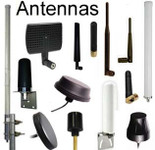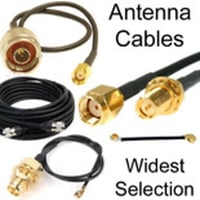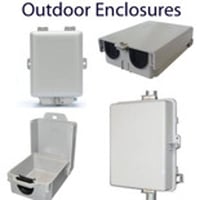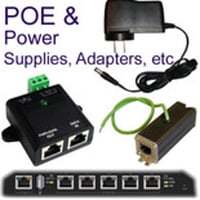Adapters with MCX or MMCX connector
MMCX and MCX RF Adapters for Antenna Connections
Types of MCX & MMCX Adapters:
- Straight Adapters: Standard type used in most applications.
- Right Angle Adapters: Designed for tight spaces or specific angles to reduce bending stress on the cable.
- Bulkhead Adapters: For panel mounting.
- PCB Mount Adapters: For direct mounting on printed circuit boards.
Compatible Wireless Protocols and Technologies:
MCX connectors and their adapters are primarily used in RF applications. This includes wireless technologies like:
- GPS (Global Positioning Systems)
- GSM (Global System for Mobile Communications)
- WiFi
- Satellite communication
- Antennas for wireless devices.
The miniaturized design of MCX adapters ensures efficient performance even in tight spaces, making them a popular choice for these technologies.
Torque Ratings
One key aspect of MCX adapters is their torque rating, which essentially refers to the optimal tightness to ensure a solid connection without over-tightening. Standard MCX connectors typically have a torque rating of 3.5 inch-pounds for coupling. However, this may vary slightly depending on the manufacturer and specific application. It's crucial to adhere to the torque specifications to avoid damage and ensure maximum performance.
Applications: The versatility of MCX adapters means they find applications in diverse fields:
- Telecommunications: Including base stations and satellite communications.
- Broadcasting: For both radio and television.
- GPS Devices: Ensuring efficient signal transmission.
- Test and Measurement Equipment: For accurate and reliable results.
Moreover, the specific MCX to SMA-male and MCX to SMA-female adapters provide the much-needed compatibility bridge, given that SMA connectors are widely used in RF applications.
Key Features:
- Size and Weight: MCX adapters are lightweight and compact, offering a significant advantage when it comes to miniaturization needs.
- Broad Frequency Range: They can operate efficiently over a wide frequency range, generally up to 6 GHz.
- Versatility: With adapters available for numerous connector types, MCX connectors offer versatility. Notably, there are adapters for SMA-male and SMA-female, ensuring compatibility with a wide array of devices.
- Reliability: These adapters provide reliable, secure connections, vital for high-performance RF applications.
Materials Composition:
The durability and efficiency of MCX adapters can be attributed to the materials used in their composition. Common materials include:
- Brass or Stainless Steel: Used for the outer conductors because of their robust nature.
- Gold or Nickel Plating: Enhances conductivity and resistance to corrosion.
- Teflon (PTFE): Often used as an insulator due to its ability to withstand high temperatures and its excellent insulating properties.
Conclusions:
MCX adapters are integral components in the modern wireless communication industry, designed to offer seamless connections across various devices and technologies. Offering flexibility and reliability, these adapters have been an integral part of our radio-frequency (RF) ecosystems. In this article, we've delved into the depths of MCX adapters, their association with wireless technologies, features, materials, types, and notable applications.
MCX adapters, with their compact design, diverse types, and broad frequency range, have carved a niche for themselves in wireless technologies. Whether it's the world of broadcasting, the precision of GPS devices, or the daily workings of our mobile networks, these adapters play a pivotal role. Ensuring you have the right adapter for your specific needs guarantees efficient and uninterrupted performance in the ever-evolving world of wireless communication.







